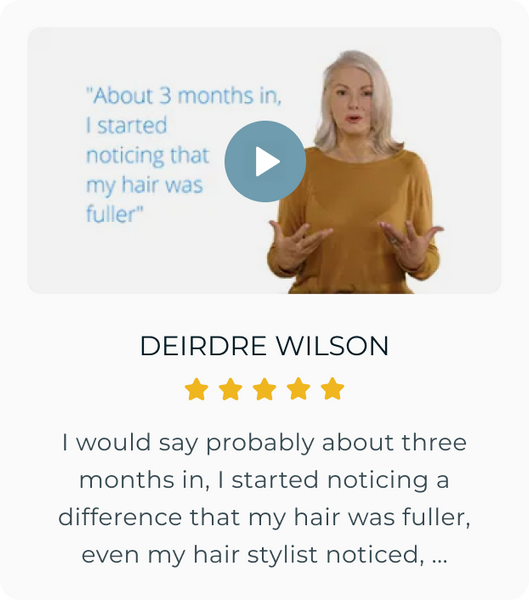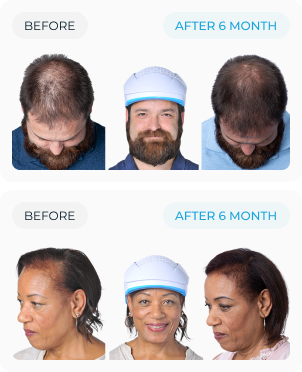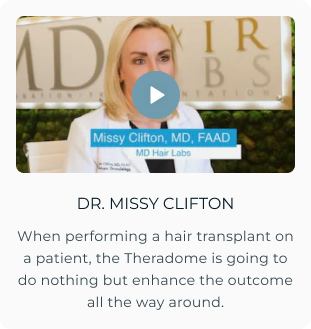Vitamin C is famous for boosting immunity and glowing skin, but can it help your hair grow, too? Many people swear by this vitamin for thickening strands or fixing split ends, but it’s hard to know if it’s backed by science or just another myth.
The whispers (and claims) are everywhere: "Vitamin C strengthens hair, promotes growth, and even fights dandruff." But let’s not confuse a health halo with hard facts.
So, does Vitamin C help hair growth?
Short answer: It can.
By supporting collagen production, enhancing nutrient absorption, and protecting against oxidative stress, Vitamin C provides several scientifically proven benefits for your hair. But here’s the thing—there’s more to the story than just popping a supplement or slathering on a serum.
In this blog, we’ll discuss the science of Vitamin C and hair growth and give you ways to harness its benefits for stronger, healthier hair.
How Does Vitamin C Help Hair Growth?
Vitamin C doesn’t just belong in your orange juice; it’s effective in the hair health department. If you’ve been wondering about Vitamin C hair growth results, here’s why it’s worth the hype.
1. Boosts Collagen Production
Your hair’s structural integrity depends on collagen, a protein that strengthens each strand and helps prevent breakage. Here’s the catch: your body needs Vitamin C to produce collagen effectively. Without it, your hair might be more prone to snapping than growing. Supporting collagen synthesis with adequate Vitamin C intake doesn’t just help your hair stay strong—it ensures it has the flexibility to withstand daily wear and tear.
2. Enhances Iron Absorption
Iron and Vitamin C are the dynamic duo your hair didn’t know it needed. Iron supports oxygen delivery to your hair follicles, fueling growth, but getting enough iron from your diet, especially plant-based sources can be tricky. Iron deficiency is one of the main reasons behind the various types of alopecia. Vitamin C improves the body’s ability to absorb iron efficiently, making sure your follicles get the nutrients they need to keep the growth cycle going. Without this teamwork, hair growth could slow, leaving you with a lackluster scalp.
3. Fights Free Radical Damage
Your hair follicles face constant threats from free radicals—unstable molecules that can damage cells and hinder growth. Vitamin C, as a potent antioxidant, steps in to neutralize these troublemakers. By reducing oxidative stress, Vitamin C helps protect your hair follicles, giving them the stability to thrive. Antioxidant protection isn’t just a buzzword; it’s an essential part of maintaining healthy, growing hair.
4. Improves Scalp Health
Hair growth starts at the scalp, and Vitamin C knows how to take care of business. By promoting better blood circulation, Vitamin C ensures that your hair follicles are well-nourished and able to function optimally. A healthy scalp creates the perfect environment for new hair growth, and this is where topical Vitamin C for hair growth might come into play—targeting the roots directly with nutrient support.
5. Tackles Dandruff
A flaky scalp isn’t just annoying—it can interfere with healthy hair growth. Vitamin C helps combat dryness and dandruff, thanks to its ability to maintain proper moisture balance and support the scalp’s natural defenses. By keeping your scalp free of flakes, Vitamin C lays the groundwork for steady hair growth without disruptions.
When it comes to supporting your hair’s health, Vitamin C doesn’t just play a supporting role; it’s one of the main players. By boosting collagen, improving nutrient absorption, and protecting against damage, this nutrient delivers results that go far beyond what’s in your glass of orange juice.
How to Take Vitamin C for Hair Growth?
There are plenty of ways to ensure you’re getting enough Vitamin C to support hair growth. From shampoos to serums to what’s on your plate, incorporating this powerhouse nutrient into your routine can help you achieve stronger, healthier locks.
Here’s how to maximize Vitamin C for hair strength and why these options work.
Shampoos
Vitamin C shampoos provide a no-fuss way to deliver nutrients directly to your scalp, where hair growth begins. Infused with antioxidant-rich Vitamin C, these shampoos help cleanse the scalp of free radicals and buildup, promoting an optimal environment for hair follicles. While shampoos get washed away and don’t stay on the scalp long enough to match the benefits of Vitamin C taken orally, applying a Vitamin C-fortified shampoo directly to your scalp (rather than just the hair shaft) ensures better cleansing and increases the chance of absorption, creating a healthier foundation for hair growth. Always pick the shampoo that is free from harsh ingredients.
Conditioners
Conditioners infused with Vitamin C offer the dual benefit of nourishing your hair and locking in moisture. They provide your strands with a nutrient boost that can help combat dryness and brittleness, common culprits behind breakage. While conditioners don’t address hair growth at the follicular level, they support overall strand health, ensuring your hair remains smooth and strong.
Hair Serums
Hair serums containing Vitamin C are the heavyweights of topical treatments. These concentrated solutions target your scalp and follicles directly, delivering a high dose of antioxidants to combat free radical damage. By improving blood flow to the scalp and nourishing hair roots, Vitamin C serums can enhance follicle health and contribute to thicker, healthier hair over time. They’re a favorite for addressing oxidative stress that can impede growth.
Foods
Let’s not forget the simplest and most effective way to get Vitamin C—your diet. Foods like oranges, strawberries, kiwi, and broccoli are packed with Vitamin C and work wonders from the inside out. Unlike topical products, dietary Vitamin C contributes to collagen production, iron absorption, and overall systemic health, creating the perfect conditions for hair growth. If you’re considering Vitamin C hair growth supplements, they can be a helpful addition, but whole foods remain the gold standard.
Incorporating Vitamin C into your routine doesn’t have to be complicated. Whether you focus on topical applications, dietary changes, or both, each method plays a role in supporting your hair’s health and growth potential. Balancing these options ensures you’re giving your hair the care it needs from every angle.
Combine Vitamin C with Vitamin E for Hair Health
Vitamin C may be the headliner for hair health, but even superheroes need a sidekick. Enter Vitamin E. While Vitamin C tackles free radicals and aids in collagen production, Vitamin E complements its efforts by amplifying antioxidant defense and promoting repair. Together, they form a dream team to create the perfect environment for healthy, thriving hair.
Here’s why the combo works: Vitamin E improves scalp circulation and enhances nutrient delivery to hair follicles, while Vitamin C ensures your follicles are fortified against oxidative stress. This dynamic duo also supports cell regeneration, a critical process for strengthening hair strands and reducing damage. Neglecting either vitamin could lead to less-than-stellar results, as a Vitamin C deficiency and hair loss often go hand in hand with poor scalp health and sluggish repair.
In short, combining Vitamin C and Vitamin E is a no-brainer for anyone serious about hair health. They’re the scalp’s version of peanut butter and jelly—individually great, but together, practically unstoppable. Add them both to your hair care routine, whether through diet or targeted products, and you’ll maximize your hair growth potential while keeping your follicles happy.
However, note that megadosing Vitamin C won’t do your hair (or your wallet) any favors. Your body can only absorb so much Vitamin C at a time, and any excess will simply be flushed out in your urine. Stick to recommended daily intakes to avoid wasting money on unnecessary supplementation.
Are you getting sufficient vitamin C for your hair?
If you don’t get enough vitamin C, your hair might become dry, weak, or even start thinning. Foods like oranges, strawberries, bell peppers, and spinach are packed with vitamin C, so adding these to meals can give your hair the boost it needs.
How much is enough? Most adults need about 75–90 mg of vitamin C daily, which is easy to get from a balanced diet. But if you’re stressed, smoke, or eat mostly processed foods, you might need more. While supplements can help, too much vitamin C can upset your stomach, so focus on food first. If you’re unsure, ask a doctor or nutritionist to check if you’re on track.
Conclusion
Vitamin C is a critical component of your hair’s health and growth, along with many other healthy habits like eating a balanced diet and exercising regularly. By promoting collagen production, enhancing iron absorption, and protecting against oxidative damage, Vitamin C works tirelessly behind the scenes to keep your hair strong and resilient. Combine it with complementary nutrients like Vitamin E, and you’ve got a powerhouse team for healthy, vibrant hair.
If you're looking for a more advanced solution beyond vitamins, the Theradome laser helmet is a powerful option to consider. While Vitamin C supports overall hair health by boosting collagen and fighting oxidative stress, laser therapy goes a step further by directly stimulating hair follicles. The Theradome helmet uses medical-grade lasers to improve blood flow to the scalp, helping revive dormant follicles and promote thicker, healthier hair over time. It’s FDA-cleared, safe for home use, and fits easily into your routine. For those seeking a clinically proven method to boost hair growth, combining laser therapy with good nutrition can deliver noticeable, long-term results.

























